Contents
Contents
- Choosing the Best Pool Deck Material
- 1. Wood
- 2. Stone
- 3. Pavers
- 4. Artificial Turf
- Comparing Different Pool Decking Materials
- Factors to Consider for Slip Resistance
- Enhancing Slip Resistance with Pool Deck Coatings
- How do pool deck coatings work?
- Benefits of pool deck coatings
- Question-answer:
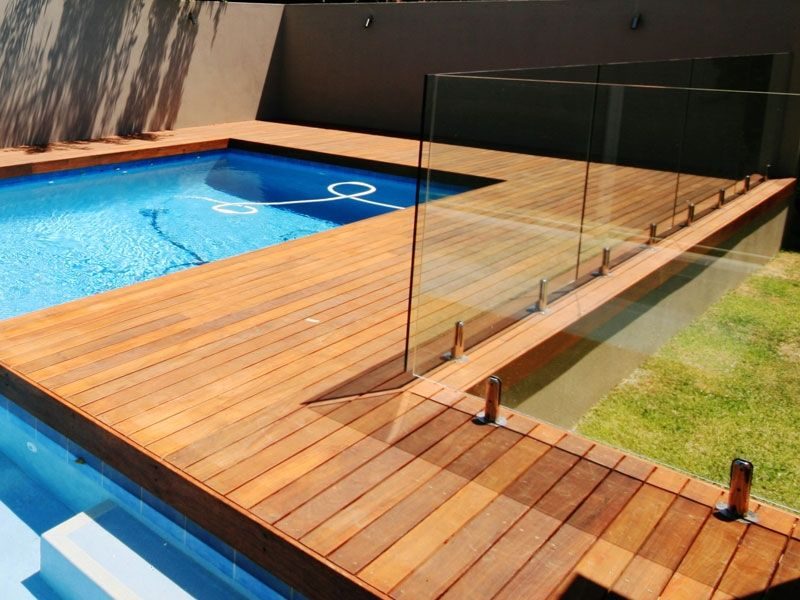
When it comes to pool decking options, there are a wide array of materials to choose from. Each type of surface has its own unique qualities and benefits, making it important to consider what will work best for your poolside area. Whether you’re looking for a low-maintenance finish or a natural, rustic aesthetic, finding the right material can make all the difference.
One popular choice for pool decking is artificial grass. Synthetic grass provides a soft and comfortable surface that is ideal for poolside lounging. It requires no mowing or watering and stays green and vibrant all year round. Additionally, artificial grass is slip-resistant, making it a safe choice for families with children or elderly individuals.
Another option to consider is porcelain tiles. These beautiful, paved-looking tiles come in a variety of colors and finishes, providing a sleek and modern look to your pool deck. Porcelain tiles are heat-reflective, meaning they stay cooler on hot days and are less likely to burn your feet. They are also easy to clean and require minimal maintenance, making them a practical choice for busy pool owners.
If you’re on a budget, concrete is a great choice for pool decking. Concrete can be finished in a variety of ways, from stamped and colored designs to a simple, plain grey surface. It provides a sturdy and durable base for your pool and is easy to maintain. However, it’s important to note that concrete can be slippery when wet, so it’s important to choose a textured finish or consider adding a non-slip treatment for safety.
For a more natural and luxurious look, consider using natural stone materials such as travertine, granite, marble, or limestone. These materials provide a high-end finish that can elevate the overall aesthetic of your pool deck. They are available in a variety of colors and textures, allowing you to create a unique and personalized look. Keep in mind that natural stone can be more expensive and may require more maintenance to keep it looking its best.
Finally, if you’re looking for a low-maintenance and slip-resistant option, consider using synthetic decking materials. These materials are constructed from a combination of wood and synthetic fibers, providing the look and feel of real wood without the drawbacks. Synthetic decking is weather-resistant, won’t rot or splinter, and requires minimal upkeep. It’s a great choice for pool owners who want the beauty of wood without the hassle of regular maintenance.
Choosing the Best Pool Deck Material
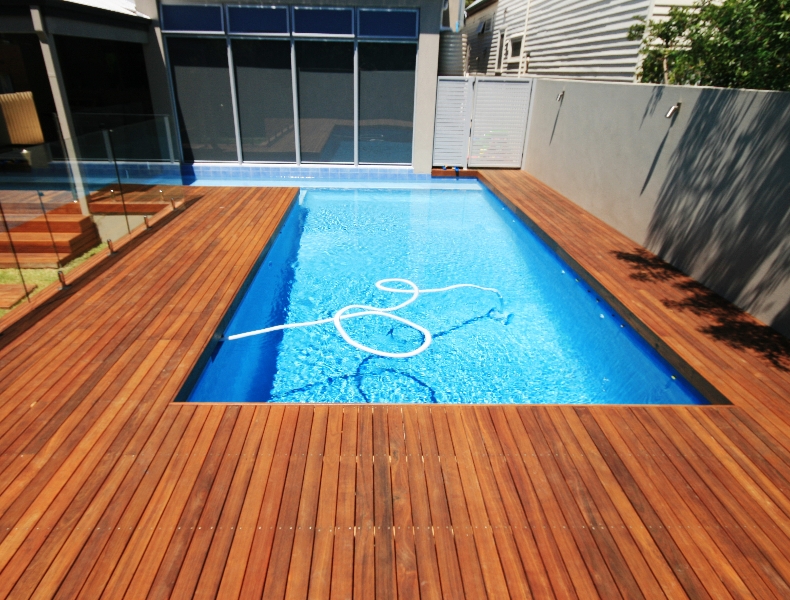
When it comes to choosing the best pool deck material, there are many factors to consider, such as budget, design, and overall durability. The pool deck is an important element of any pool and plays a significant role in the overall aesthetics and functionality of the space. In this article, we will explore different pool deck materials and provide tips on selecting the right one for your needs.
1. Wood
Wooden pool decks are a popular choice for those who want a natural and attractive look. Wood is easy to work with, and it can be stained or painted to match your preferred style. However, wood requires regular maintenance, as it can rot, warp, or splinter over time. It’s also not the most heat-resistant option, and it may get slippery when wet. If you live in an area with extreme weather conditions or near water bodies, wood may not be the ideal choice for your pool deck.
2. Stone
Stone pool decks, such as slate, offer a more durable and heat-reflective option. They can withstand harsh weather conditions and provide a slip-resistant surface. Stone pool decks are available in various colors and designs, allowing you to create a unique and attractive space. However, they can be more expensive and require professional installation. Additionally, some stone materials may get hot under the sun, which could make them uncomfortable to walk on during summer months.
3. Pavers
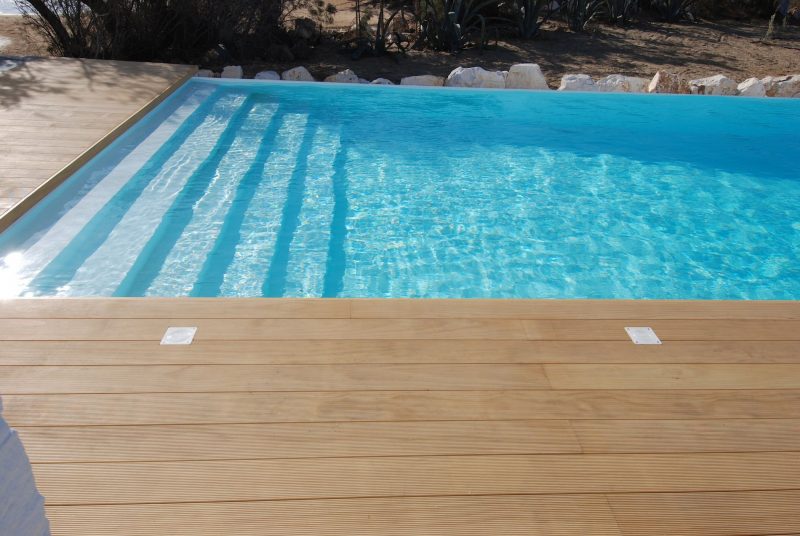
Paved pool decks are a cost-effective and eco-friendly option. They come in various materials, including concrete, brick, and pebbles. Concrete pavers are the most common choice due to their affordability and versatility. They can be colored or stamped to mimic other materials like stone or wood. Brick pavers provide a classic and timeless look but may require more maintenance as they can get stained or mossy over time. Pebble paving offers an attractive and slip-resistant surface, but it may be more challenging to clean. Paved pool decks are typically easy to maintain and provide a clean and neat appearance.
4. Artificial Turf
For those who prefer a grass-like surface near their pool, artificial turf can be a pain-free and attractive option. It provides a slip-resistant and low-maintenance surface that stays green all year round. Artificial turf is ideal for small pool decks or for those who want to create a unique and contemporary look. However, it may not be the best choice for areas with high heat, as it can get hot under the sun.
When choosing the best pool deck material, you should also consider factors such as affordability, heat resistance, slip resistance, and ease of maintenance. Explore various options, weigh the pros and cons, and select the one that suits your preferences and lifestyle. Whether it’s wood, stone, pavers, or artificial turf, make sure your pool deck is constructed with the right materials to ensure its longevity and enjoyment for years to come.
Comparing Different Pool Decking Materials
When it comes to choosing the best pool deck material, there is a wide array of options available. Each material offers different benefits and considerations depending on your individual preferences and needs. It’s important to choose a pool decking material that is slip-resistant, low-maintenance, and durable to ensure its longevity and safety.
One common pool decking material is concrete, which is a popular choice due to its versatility and affordability. Concrete can be graded and stained to create various designs and patterns. It can also be textured or brushed to make it slip-resistant. Synthetic materials such as artificial grass or deck tiles are another option, as they offer an eco-friendly and low-maintenance alternative.
For those looking for something more decorative, stone and brick pool decks can add a touch of elegance to any outdoor space. Stone materials like granite or slate provide a sophisticated and timeless look, while brick adds a rustic charm. Both stone and brick can be laid in various patterns and designs to create a unique and custom look.
Another consideration when comparing pool decking materials is heat-reflectivity. Light-colored materials like concrete, composite decking, or paved pavers tend to reflect heat, making them more comfortable to walk on under the hot sun. On the other hand, darker materials like stone or synthetic decking may absorb and retain heat, which could be a factor in hotter climates.
In terms of maintenance, some materials require more upkeep than others. Natural stone and wood require periodic sealing or staining to protect them from the elements and maintain their appearance. Composite decking, on the other hand, is known for its low maintenance and resistance to rot, fading, and staining.
Ultimately, the choice of pool decking material will depend on your personal preferences, budget, and the overall design of your outdoor space. Consider factors such as slip resistance, heat-reflectivity, maintenance, and eco-friendliness when making your decision. Whether you opt for concrete, stone, brick, or synthetic materials, choosing a high-quality pool decking material will ensure a beautiful and functional pool deck for years to come.
Factors to Consider for Slip Resistance
When it comes to pool decking options, slip resistance is an important factor to consider. A slippery pool deck can be dangerous, especially when it’s wet. Here are some factors to consider when choosing a pool deck material:
- Texture: The texture of the deck plays a significant role in slip resistance. Even though some materials like porcelain tiles or granite may look great, they can become very slippery when wet. Others, like concrete or sundek, provide a more textured surface that can help prevent slips.
- Finish: The finish of the deck is also crucial. A brushed or textured finish can increase slip resistance compared to a smooth or polished one. Be cautious when choosing a deck with a high shine as it might be more slippery.
- Colour and Reflectivity: Darker colours tend to absorb more heat and can become very hot under the sun, which may cause discomfort or increase the risk of slipping. On the other hand, light coloured decks reflect sunlight and are usually cooler to walk on. Consider your climate and how much heat the deck will be exposed to when making your colour choice.
- Materials: There are various materials available for pool decking, each with its own slip resistance characteristics. Wood, for example, can be slippery, especially when it’s wet or covered with algae. Brick and flagstone are popular choices for their natural look and slip resistance. Concrete is a common and low-maintenance option, especially when applied with a slip-resistant coating.
- Paving and Other Alternatives: Besides the traditional decking materials, there are other alternatives to consider. Artificial grass with a special backing or bristles can provide a great slip-resistant surface. River rocks or shells can be used to create an attractive and slip-resistant design. Each of these materials has its own unique look and slip resistance properties.
- Overall Maintenance: Consider the maintenance requirements of each material. Some materials may require more frequent cleaning or mowing, which can affect slip resistance. Others, like concrete or porcelain, are known for their durability and low-maintenance qualities.
- Your Needs: Assess your specific needs and use of the pool area. If you have small children or elderly individuals using the pool, slip resistance should be a top priority. If you’re looking for an inground pool deck, you may have more options to choose from, as some materials are better suited for inground pools.
Remember, a slip-resistant pool deck is crucial for the safety of your loved ones. Take the time to research and find the best pool deck material that suits your preferences and needs.
Enhancing Slip Resistance with Pool Deck Coatings
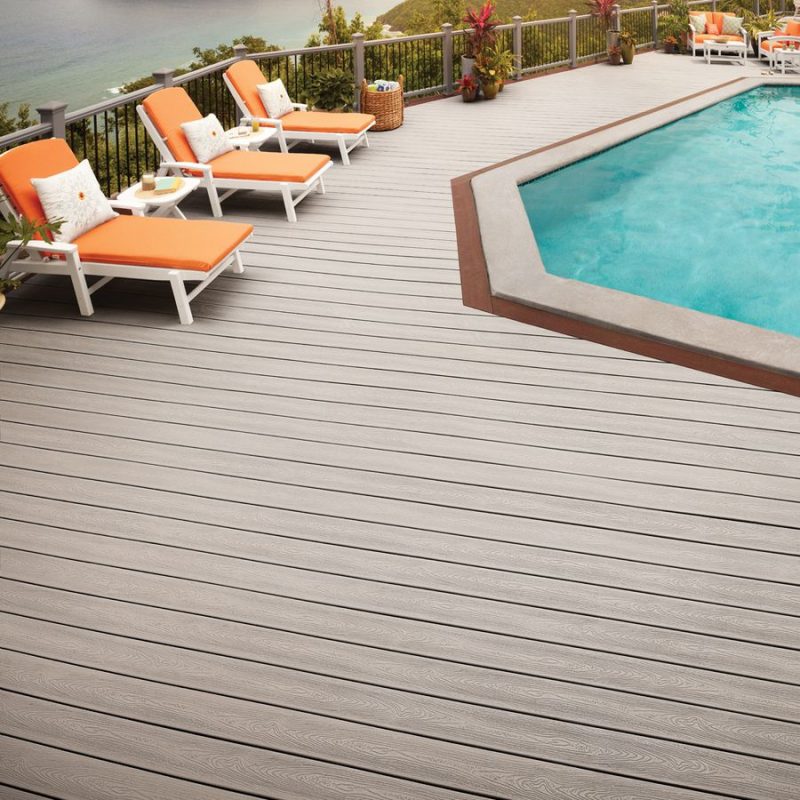
When it comes to choosing the right pool deck material, slip resistance is one of the most important factors to consider. A slippery surface can be dangerous, especially when wet, and can increase the risk of accidents and injuries around the pool area.
One of the options to enhance slip resistance is to use pool deck coatings. These coatings are designed to create a textured surface that provides better traction and reduces the chances of slipping. They can be applied to various pool deck materials, including concrete, pavers, flagstone, and more.
How do pool deck coatings work?
Pool deck coatings are typically a mix of resins and aggregates that are applied over an existing pool deck surface. They create a textured surface with small bumps or bristles that help improve slip resistance. These coatings can be customized to create different patterns, colours, and designs to match your pool area’s aesthetics.
One common pool deck coating option is Sundek, which offers a range of colours and designs. Sundek coatings use a heat-reflective technology that keeps the surface cooler under the sun, making it more comfortable for bare feet.
Benefits of pool deck coatings
- Enhanced slip resistance: The textured surface created by pool deck coatings greatly improves traction and reduces the risk of slipping.
- Heat resistance: Some pool deck coatings, like Sundek, are heat-reflective, making them more comfortable to walk on under hot conditions.
- Aesthetically pleasing: Pool deck coatings can be customized to match your desired design, adding beauty and style to your pool area.
- Durable: Pool deck coatings are constructed to withstand heavy foot traffic, pool chemicals, and harsh weather conditions, ensuring long-lasting performance.
- Cost-effective: Applying a pool deck coating is often a more affordable and quicker option compared to completely replacing the pool deck surface.
When choosing a pool deck coating, consider the specific conditions of your pool area, such as water exposure, heat, and the design you’re looking to achieve. Consulting with a pool deck professional can help you find the right coating that meets your needs.
In conclusion, pool deck coatings are a great alternative to enhance slip resistance and improve safety around your pool. They offer a cost-effective and aesthetically pleasing solution, ensuring a pain-free pool experience for you and your loved ones.
Question-answer:
What are the popular pool decking options?
Popular pool decking options include concrete, pavers, natural stone, wood, and composite materials.
What factors should I consider when choosing a pool deck material?
When choosing a pool deck material, you should consider factors such as cost, durability, slip resistance, maintenance, and aesthetics.
What is the most durable pool deck material?
The most durable pool deck material depends on personal preference, but materials like concrete and natural stone are known for their durability.
How much does it cost to install a pool deck?
The cost of installing a pool deck can vary depending on factors such as the size of the pool, the chosen material, and any additional features. On average, you can expect to spend between $5,000 and $15,000 for a pool deck installation.
Can I use wood as a pool deck material?
Yes, wood can be used as a pool deck material. However, it requires regular maintenance and may not be as durable or slip-resistant as other options.
What are some popular pool decking materials?
Some popular pool decking materials include concrete, wood, pavers, and natural stone. Each material has its own advantages and considerations to take into account when choosing the best option for your pool deck.


 Ultimate Guide How to Clean Outdoor Furniture for a Total Seasonal Refresh
Ultimate Guide How to Clean Outdoor Furniture for a Total Seasonal Refresh Stay Warm in Style with These 8 Smart Ways to Heat Your Outdoor Patio!
Stay Warm in Style with These 8 Smart Ways to Heat Your Outdoor Patio!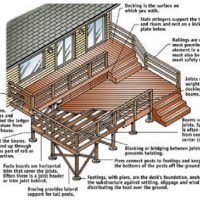 A Comprehensive Guide to Building a Patio with Step-by-Step Instructions and Expert Tips
A Comprehensive Guide to Building a Patio with Step-by-Step Instructions and Expert Tips